BBG Watch Commentary
 The initial Broadcasting Board of Governors (BBG) results from the 2014 Federal Employee Viewpoint Survey (FEVS) show further declines in employee morale and increases in negative employee perceptions of the agency’s leadership despite senior management’s attempts to win over the workforce with Bingo Nights and Ice Cream Social parties, which many rank-and-file employees and their union find offensive and designed to avoid carrying out serious management reforms.
The initial Broadcasting Board of Governors (BBG) results from the 2014 Federal Employee Viewpoint Survey (FEVS) show further declines in employee morale and increases in negative employee perceptions of the agency’s leadership despite senior management’s attempts to win over the workforce with Bingo Nights and Ice Cream Social parties, which many rank-and-file employees and their union find offensive and designed to avoid carrying out serious management reforms.
The FEVS surveys apply only to the federal part of the BBG: the International Broadcasting Bureau (IBB), the Voice of America (VOA), and the Office of Cuba Broadcasting (OCB – Radio and TV Marti). The agency’s private grantee media entities — Radio Free Europe / Radio Liberty (RFE/RL), Radio Free Asia (RFA), and Middle East Broadcasting Networks (MBN – Alhurra TV and Radio Sawa) — are better managed and not surveyed by the OPM.
More than 600 contractors working at VOA, IBB, and OCB are also not surveyed by the OPM. They are paid much less and treated much worse by the management than full-time government workers. Had these contract employees at VOA, IBB, and OCB been included in the survey, the FEVS would almost certainly be much worse.
The Office of the Inspector General (OIG) and the Internal Revenue Service (IRS) have determined through audits that employment of the vast majority (about 600) of BBG contract employees at VOA, IBB, and OCB violates various federal government regulations, including the Anti-Deficienty Act
A study by the Partnership for Public Service (PPS) found earlier that the Broadcasting Board of Governors managers, including Voice of America executives, were once again dead last among mid-size federal agencies in internal communication skills. SEE: Worst Agencies for Internal Communication, Ian Smith, FedSmith.com, July 31, 2014. The Broadcasting Board of Governors was placed last (21) in mid-size agency leadership communication rankings.
Respect for Senior Leaders at BBG (Federal Government Only)
2013
[wppb progress=45 option=”animated-candystripe blue” fullwidth=true text=”I have a high level of respect for my organization’s senior leaders. Percent Positive 2013 – 45.75%”]2014
[wppb progress=39 option=”animated-candystripe red” fullwidth=true text=”I have a high level of respect for my organization’s senior leaders. Percent Positive 2014 – 39.53%”]6.22% Decline Between 2013 and 2014
The Office of Personnel Management (OPM) has published the initial results from the 2014 Federal Employee Viewpoint Survey (FEVS) for the Broadcasting Board of Governors (BBG). They show further significant declines in employee confidence in senior leadership, as well as in employee morale and job satisfaction. As reported earlier this year by Joe Davidson (February 2014) in The Washington Post, since 2007, the BBG has been at or near the bottom in the “Best Places to Work in the Federal Government” ratings, issued by the Partnership for Public Service and using FEVS data. The Partnership for Public Service, a nonprofit that studies federal workplace issues, has worked with the BBG on its Workplace Engagement Initiative. According to the Washington Post column, the PPS was paid about $84,000 by the BBG for a series of workshops and other activities. The 2014 FEVS results showed that there has been no improvement in employee morale or in any other management and leadership assessment category. All 70 categories related to management’s performance have shown declines in 2013/2014 survey period as compared to 2012/2013.
Results of OPM’s FEVS for BBG from 2007 to 2014 are available online on the BBG website.
The agency’s senior executives admitted in a memo to the staff that “there were significant decreases (a difference of 5 percentage points or more) on 14 survey questions related to employee involvement in decision making, employee recognition, and overall job and organizational satisfaction.”
[aside] caption = Senior Management Saysalignment = right
width = 300px
collapse_state = expanded
bg_colour = #F7F9FC
2014 Federal Employee Viewpoint Survey – BBG Results
The Office of Personnel Management has provided the initial BBG results from the 2014 Federal Employee Viewpoint Survey (FEVS). Thank you for taking time to provide your feedback.
Among eligible employees, 69% took the survey. The results show that individual belief and commitment to our work remains very high, above 90%. However, there were significant decreases (a difference of 5 percentage points or more) on 14 survey questions related to employee involvement in decision making, employee recognition, and overall job and organizational satisfaction.
While the agency continued to see modest increases in responses related to work/life programs, there were declines in areas that are persistent challenges, including leadership.
This initial OPM data release provides agency-wide responses. OPM is expected to release additional data for the BBG and the rest of the government that provides useful context and detail later this month. The results will continue to shape the agency’s ongoing efforts to improve workplace engagement. All of us are committed to making this a better place to work.
The initial FEVS results are posted here: http://www.bbg.gov/about-the-agency/research-reports/federal-employee-viewpoint-surveys/
André Mendes
Rob Bole
Suzie Carroll
David Ensor
Carlos García-Perez
[/aside]
What senior International Broadcasting Bureau (IBB) executives and the heads of Voice of America (VOA) and the Office of Cuba Broadcasting (OCB – Radio and TV Marti) failed to mention was that out of 72 substantive OPM questions, the percentage of “positive responses” from employees dropped from 2013 to 2014 for 70 of these questions. The 2013 OPM survey covers mid-2012-mid-2013. The 2014 survey covers mid-2013-mid-2014 period.
The only statements or questions for which BBG employees gave more positive responses in 2014 as opposed to 2013 were:
“The work I do is important.” 89.82 Percent Positive in 2013; 90.14 Percent Positive in 2014.
“Overall, how good a job do you feel is being done by your immediate supervisor?” 60.56 Percent Positive in 2013; 60.82 Percent Positive in 2014.
In a semantic spin on the OPM survey results, senior executives said that they “show that individual belief and commitment to our [Emphasis added.] work remains very high, above 90%.” The employees were in fact giving very high scores to “their own work,” not the work of “senior leaders.” In fact, the only two questions which generated above 90% positive response related to how employees evaluate their own job and their own commitment.
“The work I do is important,” was one of the two questions with 90.14% positive response in 2014. The other question was: “When needed I am willing to put in the extra effort to get a job done.” It got 95.87% positive response in 2014.
The other 70 substantive OPM questions all showed declines in positive responses in 2014 as compared to 2013. What the memo from senior leaders also failed to note was that the biggest declines in positive responses were in fact to questions related to employee assessment of “senior leaders.”
Employees were less critical of their immediate supervisors, but in response to the statement: “I have a high level of respect for my organization’s senior leaders,” the percentage of positive responses dropped by 6.22% between 2013 and 2014.
The senior executives memo, however, did acknowledge that “there were declines in areas that are persistent challenges, including leadership.”
In response to the question: How satisfied are you with the policies and practices of your senior leaders?, the decline was 3.9%.
In response to the statement: “I recommend my organization as a good place to work,” the drop was 6.36%.
In response to the question: “Considering everything, how satisfied are you with your job?,” the decline of positive employee responses between 2013 and 2014 was 5.16%.
In response to the all important question: “Considering everything, how satisfied are you with your organization?,” the decline of positive employee responses was 5.07%.
The 2013 OPM Federal Employee Viewpoint Survey was conducted between April 30, 2013 and June 14, 2013.
The 2014 OPM Federal Employee Viewpoint Survey was conducted between May 6, 2014 and June 13, 2014.
On January 22, 2014, the Broadcasting Board of Governors established an interim management structure for its International Broadcasting Bureau with three senior executives — André Mendes, Director of Global Operations; Robert Bole, Director of Global Strategy; Suzie Carroll, Director of Global Communications — appointed to manage the day-to-day operations of the agency. They are relatively new in their senior leadership positions and would have had only three months to turn the agency around when the OPM survey was taken.
While some employees consider them better than the previous IBB management team, their appointment in January 2014 did not seem to have improved the agency’s FVES ratings in any significant way, which have in fact declined across the board for the 2013-2014 period after showing minor improvements in some categories in the 2012-2013 period.
Employee morale may have improved slightly in the 2013 OPM survey after pressure from the U.S. Congress and NGO groups prevented agency executives and the previous BBG board from carrying out program cuts to China and Tibet in 2011 and 2012. But even in 2013 and in previous surveys the agency was still at the bottom of federal agencies of similar size in the OPM employee satisfaction and management skills assessments.
Other executives have been running the agency much longer than the current new interim IBB management team. These longtime executives were in charge of various agency federal elements throughout the entire 2013 and in 2014 period covered by the OPM survey.
Former IBB Director retired on November 30, 2013. He had been in charge of the IBB for more than three years. Current Voice of America Director David Ensor has been in his position since June 2011. Carlos García-Pérez has been Director of the Office of Cuba Broadcasting since October 2010.
Other senior IBB and VOA executives who are still in their senior positions have been managing the federal agency and VOA also for many years. At least one of them has been with BBG and IBB in senior level positions at least since 2007. Some of the others served even longer in various mid-level and senior-level management jobs. But most if not all of these longtime executives blame successive bipartisan BBG boards rather than themselves for the persistent leadership and management crisis. Critics point out, however, that these executives in fact had advised various BBG boards to make decisions that proved fatal to the agency’s effectiveness, employee morale, and confidence on Capitol Hill in the agency’s leadership.
The union representing BBG employees, AFGE Local 1812, strongly blames largely some of these longtime senior IBB and VOA executives for the management crisis, dismal employee morale and other poor OPM Federal Employee Viewpoint Survey results.
AFGE LOCAL 1812: While we salute Andre Mendes’ apparent commitment to making the Agency better as expressed in a recent Washington Post article, we can’t help but feel that many of the optimistic arguments presented by management in Joe Davidson’s recent Washington Post column, “Agency tries to improve its low employee morale“, sound tired, repetitive and banal.
As documented in the OPM Employee Viewpoint Surveys, this Agency has had low morale for over 10 years. When Agency official (…) is quoted as saying, “We’re still very early on in this process, which could take three to five years to complete”, we have to ask — where have these managers been? (…) If these managers have taken 10 years to identify that there is a problem and that it will take another five to correct it, why are they still calling the shots? What is obvious to almost everyone is that these managers are the problem and what is needed is to remove them to make way for fresh faces.
The job of reforming the federal bureaucracy of the Broadcasting Board of Governors may now be left to the future CEO of the BBG and/or the U.S. Congress and President Obama. On September 23, 2014, the bipartisan board of the Broadcasting Board of Governors announced that it intends to hire respected journalist and media executive Andrew Lack as Chief Executive Officer of the federal agency. Lack’s appointment, however, has not yet been finalized, although there seems to be a legislative basis for him to take up his position, which is now hung up in the government hiring process.
Another push to reform the agency is coming from the U.S. Congress among both Republicans and Democrats. H.R. 4490, the bipartisan United States International Communications Reform Act “to improve the missions, objectives, and effectiveness of U.S. international broadcasters,” was introduced on April 28, 2014 by Rep. Ed Royce (R-CA) and Rep. Eliot Engel (D-NY), approved unanimously by the House Foreign Affairs Committee and passed by the full House of Representatives. The bill now awaits further legislative action in the U.S. Senate.
In SEC. 2. FINDINGS AND DECLARATIONS of H.R. 4490, the Foreign Affairs Committee and other members of the House of Representatives agreed without a single dissenting vote that:
H.R. 4490: (15) The annual survey conducted by the “Partnership for Public Service” consistently ranks the Broadcasting Board of Governors at or near the bottom of all Federal agencies in terms of “overall best places to work” and “the extent to which employees feel their skills and talents are used effectively.” The consistency of these low scores point to structural, cultural, and functional problems at the Broadcasting Board of Governors.
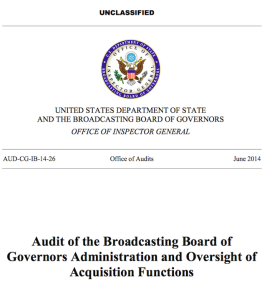 Legislators have also made other serious accusations against IBB and other agency managers based on findings from the Office of the Inspector General:
Legislators have also made other serious accusations against IBB and other agency managers based on findings from the Office of the Inspector General:
H.R. 4490: (11) According to the Office of the Inspector General, the BBG’s Office of Contracts is not in compliance with the Federal Acquisition Regulation, lacks appropriate contract oversight, and violates the Anti-Deficiency Act. The Office of the Inspector General also determined that the Broadcasting Board of Governors has not adequately performed full and open competitions or price determinations, has entered into hundreds of personal service contracts without statutory authority, and contractors regularly work without valid contracts in place.
H.R. 4490: (3) Secretary of State Hillary Clinton testified before the Committee on Foreign Affairs of the House of Representatives on January 23, 2013, that the Broadcasting Board of Governors (BBG) “is practically a defunct agency in terms of its capacity to be able to tell a message around the world. So we′re abdicating the ideological arena and need to get back into it.”
Significant Declines in OPM 2014 Employee Survey for BBG Senior Leaders’ Skills and Agency Management (Federal Government Entities Only)
alignment = right
width = 300px
collapse_state = expanded
bg_colour = #F7F9FC
2014 Federal Employee Viewpoint Survey – BBG Results: “The results will continue to shape the agency’s ongoing efforts to improve workplace engagement. All of us are committed to making this a better place to work.
2013 Federal Employee Viewpoint Survey – BBG Results: “The BBG saw significant (a difference of 5 percentage points or more) improvement on ten survey questions and no significant decreases. (…) Along with continued strengths in terms of a high level of commitment and personal satisfaction from employees, the agency has some persistent challenges including performance management and leadership related issues. (…) the BBG initiated a Workplace Engagement Plan with 12 action teams in March of 2013 just prior to the April 2013 survey. While not yet reflected in the survey results, the efforts that are underway draw upon the experience of the Partnership for Public Service working with other federal agencies, include engaging a group of trained employee-facilitators, and tap into teams of employees and leaders across the agency to address workplace issues.”
2012 Federal Employee Viewpoint Survey – BBG Results: “Of the 77 questions in common from the 2010 to the 2011 surveys, BBG scores declined by five or more points on eight questions.These results will be instrumental as the agency works in close collaboration with employees, including through workshops facilitated by the Partnership for Public Service, to address these issues. Both will inform and shape an action plan that is slated to be announced in January 2013 and will be designed to make BBG a better place to work.”
[/aside]
I recommend my organization as a good place to work. 6.36% Decline Between 2013 and 2014
In my organization, senior leaders generate high levels of motivation and commitment in the workforce. 2.89% Decline Between 2013 and 2014
My organization’s leaders maintain high standards of honesty and integrity. 4.79% Decline Between 2013 and 2014
I have a high level of respect for my organization’s senior leaders. 6.22% Decline Between 2013 and 2014
How satisfied are you with your involvement in decisions that affect your work? 6.78% Decline Between 2013 and 2014
How satisfied are you with the information you receive from management on what’s going on in your organization? 2.27% Decline Between 2013 and 2014
How satisfied are you with the recognition you receive for doing a good job? 5.96% Decline Between 2013 and 2014
How satisfied are you with the policies and practices of your senior leaders? 3.9% Decline Between 2013 and 2014
Considering everything, how satisfied are you with your job? 5.16% Decline Between 2013 and 2014
I have sufficient resources (for example, people, materials, budget) to get my job done. 2014 Percent Positive: 29.60%. 2013 Percent Positive: 35.12% 5.52% Decline Between 2013 and 2014
Promotions in my work are based on merit. 2014 Percent Positive: 28.15%. 2013 Percent Positive: 28.52% 0.37% Decline Between 2013 and 2014
Creativity and innovation are rewarded. 2014 Percent Positive: 28.47%. 2013 Percent Positive: 30.11% 1.64% Decline Between 2013 and 2014
In my work unit, steps are taken yo deal with a poor performer who cannot or will not improve. 2014 Percent Positive: 23.85%. 2013 Percent Positive: 25.28% 1.43% Decline Between 2013 and 2014
I can disclose a suspected violation of any law, rule or regulation without fear of reprisal. 2014 Percent Positive: 45.20%. 2013 Percent Positive: 46.69% 1.49% Decline Between 2013 and 2014
Pay raises depend on how well employees perform their jobs. 2014 Percent Positive: 14.61%. 2013 Percent Positive: 15.38% 0.77% Decline Between 2013 and 2014
BROADCASTING BOARD OF GOVERNORS
2013 AND 2014 FEDERAL EMPLOYEE VIEWPOINT SURVEY RESULTS COMPARED
Recommend Organization As A Good Place to Work
2013
[wppb progress=46 option=”animated-candystripe blue” fullwidth=true text=”I recommend my organization as a good place to work. Percent Positive 2013 – 46.42%”]2014
[wppb progress=40 option=”animated-candystripe red” fullwidth=true text=”I recommend my organization as a good place to work. Percent Positive 2014 – 40.06%”]6.36% Decline Between 2013 and 2014
Commitment Of Senior Leaders To Workforce
2013
[wppb progress=32 option=”animated-candystripe blue” fullwidth=true text=”In my organization, senior leaders generate high levels of motivation and commitment in the workforce. Percent Positive 2013 – 32.36%”]2014
[wppb progress=29 option=”animated-candystripe red” fullwidth=true text=”In my organization, senior leaders generate high levels of motivation and commitment in the workforce. Percent Positive 2014 – 29.47%”]2.89% Decline Between 2013 and 2014
High Standards Of Honesty And Integrity By Organization’s Leaders
2013
[wppb progress=41 option=”animated-candystripe blue” fullwidth=true text=”My organization’s leaders maintain high standards of honesty and integrity. Percent Positive 2013 – 41.79%”]2014
[wppb progress=37 option=”animated-candystripe red” fullwidth=true text=”My organization’s senior leaders maintain high standards of honesty and integrity. Percent Positive 2014 – 37.00%”]4.79% Decline Between 2013 and 2014
Respect for Senior Leaders
2013
[wppb progress=45 option=”animated-candystripe blue” fullwidth=true text=”I have a high level of respect for my organization’s senior leaders. Percent Positive 2013 – 45.75%”]2014
[wppb progress=39 option=”animated-candystripe red” fullwidth=true text=”I have a high level of respect for my organization’s senior leaders. Percent Positive 2014 – 39.53%”]6.22% Decline Between 2013 and 2014
Employee Involvement
2013
[wppb progress=45 option=”animated-candystripe blue” fullwidth=true text=”How satisfied are you with your involvement in decisions that affect your work? Percent Positive 2013 – 45.41%”]2014
[wppb progress=38 option=”animated-candystripe red” fullwidth=true text=”How satisfied are you with your involvement in decisions that affect your work? Percent Positive 2014 – 38.63%”]6.78% Decline Between 2013 and 2014
Information Sharing By Management
2013
[wppb progress=38 option=”animated-candystripe blue” fullwidth=true text=”How satisfied are you with the information you receive from management on what’s going on in your organization? Percent Positive 2013 – 38.99%”]2014
[wppb progress=36 option=”animated-candystripe red” fullwidth=true text=”How satisfied are you with the information you receive from management on what’s going on in your organization? Percent Positive 2014 – 36.72%”]2.27% Decline Between 2013 and 2014
Management Recognition of Employee Achievement
2013
[wppb progress=41 option=”animated-candystripe blue” fullwidth=true text=”How satisfied are you with the recognition you receive for doing a good job? Percent Positive 2013 – 41.77%”]2014
[wppb progress=35 option=”animated-candystripe red” fullwidth=true text=”How satisfied are you with the recognition you receive for doing a good job? Percent Positive 2014 – 35.81%”]5.96% Decline Between 2013 and 2014
Employee Satisfaction With Policies and Practices of Senior Leaders
2013
[wppb progress=32 option=”animated-candystripe blue” fullwidth=true text=”How satisfied are you with the policies and practices of your senior leaders? Percent Positive 2013 – 32.81%”]2014
[wppb progress=28 option=”animated-candystripe red” fullwidth=true text=”How satisfied are you with the policies and practices of your senior leaders? Percent Positive 2014 – 28.91%”]3.9% Decline Between 2013 and 2014
Employee Job Satisfaction
2013
[wppb progress=64 option=”animated-candystripe blue” fullwidth=true text=”Considering everything, how satisfied are you with your job? Percent Positive 2013 – 64.31%”]2014
[wppb progress=59 option=”animated-candystripe red” fullwidth=true text=”Considering everything, how satisfied are you with your job? Percent Positive 2014 – 59.15%”]5.16% Decline Between 2013 and 2014
Employee Satisfaction With Organization
2013
[wppb progress=47 option=”animated-candystripe blue” fullwidth=true text=”Considering everything, how satisfied are you with your organization? Percent Positive 2013 – 47.30%”]2014
[wppb progress=42 option=”animated-candystripe red” fullwidth=true text=”Considering everything, how satisfied are you with your organization? Percent Positive 2014 – 42.23%”]5.07% Decline Between 2013 and 2014
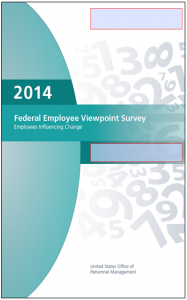

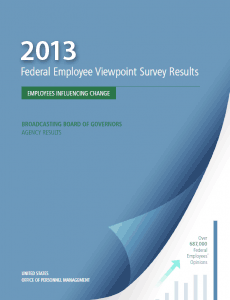
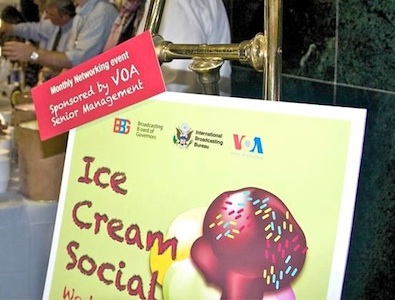


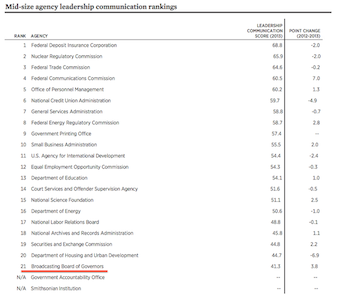
Comments are closed.